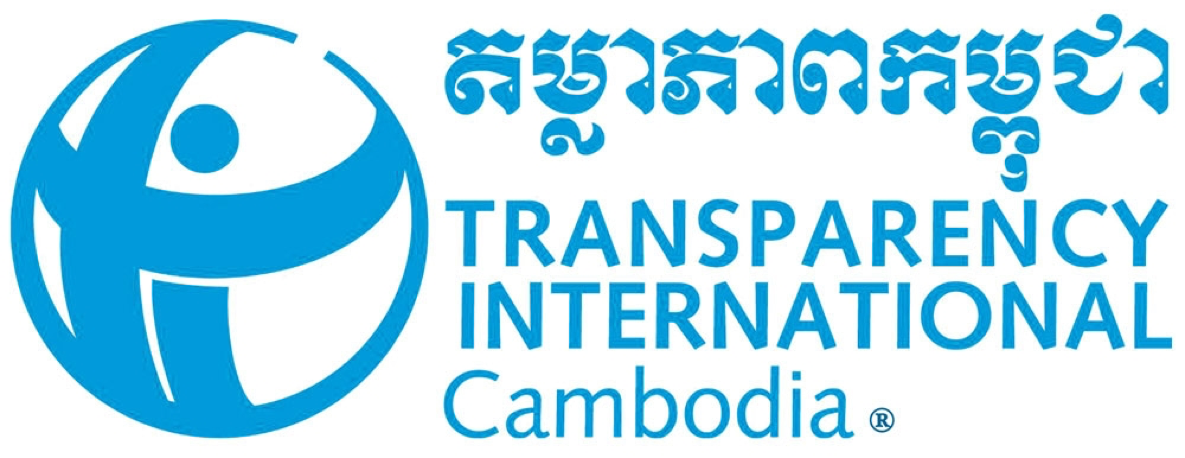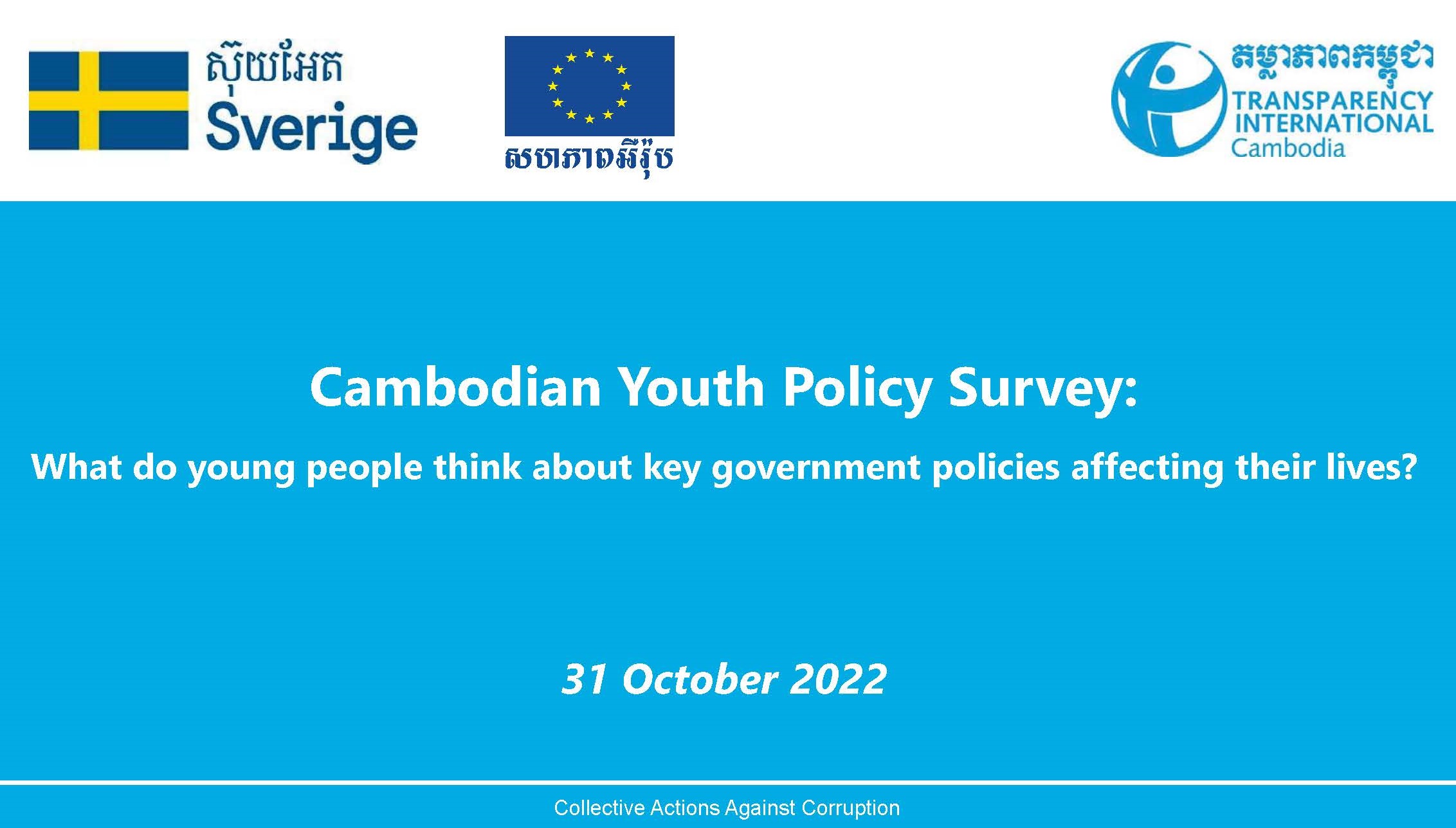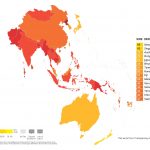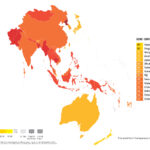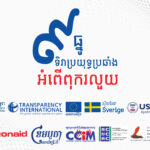Cambodian Youth Policy Survey highlights limited knowledge of and involvement in key public policies among Cambodian youth
Phnom Penh, 31 October 2022 – Cambodian youth have limited awareness of major government development policies and strategies and their views are divided over the effectiveness of government programmes related to youth health, education, employment and civic engagement, according to the results of a survey released today by Transparency International Cambodia (TI Cambodia).
The face-to-face, nationally representative survey was conducted with 1,600 Cambodians, aged 15 to 30 years, and had a margin of error of plus or minus 2 percentage points. Data collection took place between November and December 2021 in 200 villages across 25 provinces of Cambodia.
The survey offered insights into young people’s levels of interest and knowledge of government affairs, particularly key public policies, their needs and challenges in the areas of healthcare, education, employment and civic involvement, and their opinions on how well the government has responded to these concerns and aspirations.
The results of the survey indicate that young Cambodians’ levels of knowledge of key government’s development strategies, in general, and youth policies, in particular, were low. For example, ninety per cent of respondents said they had never heard of the Rectangular Strategy IV. Nearly the same proportion (89%) said they had not heard of the Cambodian Sustainable Development Goals. Eighty-four per cent said they had no knowledge of the National Strategic Development Plan. Only 15% said they had ever heard of the 2011 National Policy on Youth Development.
Dr. Chunly Sereyvicheth, the lead researcher of the study, noted that youth’s spotty knowledge of these important government documents partly reflects a lack of interest and knowledge in public affairs in general among young citizens. “But it also suggests that the Government’s efforts to meaningfully engage youth—who make up a significant share of the population—in the country’s policy and political processes remain insufficient,” he added.
The survey also found that although the majority of youth said their standard of living had improved, they continue to face a wide range of constraints when it comes to their healthcare, education, employment and civic engagement. For example, fourteen per cent of survey participants reported having to delay medical treatment in the preceding year because they could not afford the cost of the treatment. Among students, nearly one third said they were worried about not having enough money to pay for their education. When it comes to employment, seventy-three per cent stated that they had not received adequate information about jobs. Meanwhile, 84 per cent thought that they lacked the necessary skills to get any job. In terms of civic and political knowledge, more than 50 per cent of youth were unaware that they have the right to participate in the formulation or monitoring of the development plans of their local governments. In addition, only one in ten youth have voiced their needs or issues to public officials.
Findings from the survey, moreover, demonstrate that youth opinions differ when it comes to their assessments of government performance and public policies in several key areas. For example, while 29 per cent of respondents thought that the goal of enhancing health service provision for youth, as set out in the 2011 National Policy on Youth Development, had been fully or largely achieved, nearly four in ten (38%) said it had been either only partially achieved or minimally achieved. Similarly, although 44 per cent of youths thought that the goal of providing youth with a quality education, as prescribed in the 2011 National Policy on Youth Development, had been either fully or largely achieved, 32% believed that it had only been partially or minimally achieved.
Speaking at the launch of the survey’s findings, Mr. Pech Pisey, Executive Director of TI Cambodia, said that trustworthy, evidence-based data can aid policymakers in truly comprehending the issues at hand and in guaranteeing that the policies they make are focused and successful. “As such, we hope the results of this study will provide all stakeholders in Cambodia, especially the government, useful insights into how Cambodian youth perceived their social, economic and civic wellbeing vis-à-vis the public policies that have had an impact or intertwined with these aspects of their lives”, he added.
Among other key findings, the survey reveals that despite the current challenges, Cambodian youth were optimistic that public services will continue to improve in the near future. Moving forward, young Cambodians surveyed said reducing corruption should be a top policy priority for the next five years, followed by increasing employment (43%), reducing poverty (40%), and increasing the quality of education (38%).
Pisey noted that increased coordinated efforts involving all relevant stakeholders—particularly the government — are needed in order to address the immediate and long-terms needs, concerns and aspirations of youth as revealed in the survey. “This may be accomplished by removing the obstacles — political, social, economic and cultural — that keep young people from making a positive contribution to the economy and society”, he added.
###
Transparency International Cambodia (TI Cambodia) is a National Chapter of Transparency International, a global movement leading the fight against corruption. We work with the Government, CSOs, businesses, the media, citizens and other stakeholders to promote transparency, integrity and accountability. This survey research is part of the Greater Young Women Empowerment in Decision Making and Accountable Public Service Delivery Project funded by the European Union (EU) and the Swedish International Development Cooperation Agency (Sida). The project aims to create an enabling environment and empower youth, particularly young women, in Cambodia to effectively participate in decision-making processes to improve public service delivery, particularly gender-responsiveness and reduce corruption in Cambodia.
To download the summary reports, in both English and Khmer, please visit our website: https://www.ticambodia.org/publications.
Media Contact:
- Pech Pisey, Executive Director of Transparency International Cambodia,
(+855) 89 972 620, piseypech@ticambodia.org
- Mr. Chunly Sereyvicheth, Research and Business Development Programme Manager of Transparency International Cambodia, csereyvicheth@ticambodia.org
Download Cambodian Youth Policy Survey Press Release
Download Cambodian Youth Policy Survey Slide Presentation
This post is also available in: Khmer
 English
English ភាសាខ្មែរ
ភាសាខ្មែរ